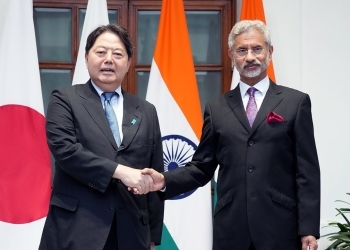"...What really does Japan means to India? Japan is in many ways the exemplary moderniser," said Dr S Jaishankar, India's External Affairs Minister.
At the inaugural session of the India-Japan forum, he said Japan is an "....example of relevance. It’s also a country for which there is a lot of goodwill in history. Today under PM Narendra Modi, we also had great modernisation."
"A self-reliant India. Japan is a natural partnership in this modernising India. Japan has truly unleashed the revolution in India. The Suzuki revolution! The second revolution was the metro revolution. The third revolution is the high-speed rail in making. The fourth revolution is in Critical and emerging technologies and semi-conductors..." he said.
Japanese Foreign Minister Hayashi Yoshimasa is on a visit to India. On July 27th he held a Japan-India Foreign Ministers' Strategic Dialogue with Dr Jaishankar.
Both the ministers concurred that the Japanese and Indian public and private sectors would work together toward the target of 5 trillion yen in public-private investment and loans to India over the next five years. This goal was set by both countries during Prime Minister Kishida Fumio's visit to India in March last year, a statement from the Japan Ministry of Foreign Affairs (MoFA) said.
Furthermore, Minister Hayashi requested cooperation to improve the investment environment and for the early establishment of a Joint Crediting Mechanism (JCM).
"The two ministers affirmed that they would continue to make steady progress on the high-speed rail project, a flagship project of Japan and India. Minister Hayashi also stated that he would advance cooperation for the development of northeastern India, which Prime Minister Modi places importance on, and to advance projects that contribute to regional connectivity. Minister Jaishankar stated that he would like to continue to work closely with Japan.
They concurred on expanding human exchanges between the two countries, such as tourism and international students, assuming that people-to-people exchanges will strengthen medium- to long-term Japan-India relations."
The two ministers affirmed that they would continue to work together as the G7 and G20 Presidencies for the success of the G20 New Delhi Summit in September this year, following the results of the Hiroshima Summit. They also affirmed cooperation in the international arena, such as in the Quad countries and Security Council reform.
As the international community reaches a historic turning point, both ministers affirmed the importance of Japan and India, who share basic values and strategic interests, cooperating to achieve a “Free and Open Indo-Pacific (FOIP).”
They also held a candid exchange of views on regional situations, including the situation in Ukraine and East Asia.
For his part Mr Yoshimasa Hayashi said,
"To expand our bilateral relationship, it is important that we promote people-to-people exchange. Our PMs agreed to further promote exchanges. This year 2023, we have named it as 'Japan-India tourism year exchange'.
"India is an integral partner in the United Nations security council where we have been working shoulder to shoulder in G4...." he said.






No comments:
Post a Comment